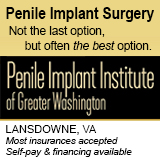Kodixx wrote:Is there any way to detect bacterial colonization, and, could or should some form of treatment be used to minimize or eliminate ? My apologies if those questions were already covered in the reference materials from above.
- Chuck
I think the only way to detect this problem would be to do a scraping of the implant surfaces. This of course would disrupt any biofilms in place and lead to a very high risk of infection. The bacteria are otherwise undetectable as they are hidden from detection behind the film's EPS matrix. Perhaps there's a way to detect the EPS itself, but that's something I have not looked at.
As I mentioned previously, I'd really like to see some aggressive studies done on using ultrasound combined with antibiotics to break up the films and expose the colonized bacteria to the antibiotics. If at first sign of infection a thorough ultrasound "cleaning" is done, combined with strong oral or IV antibiotics, my sense is that there could be far fewer revisions necessary.
This is already a practice used on other implant types, so it's not new ground. The only issue is fine-tuning the technique, frequency, and energy used for effective film disruption without harming the implant structures or patient tissues.
58yo Coloplast Titan implant scheduled for 10/23/2025 with Dr. Hakky. Pre-op erect measurements:
8.5"L and 6.5"C







